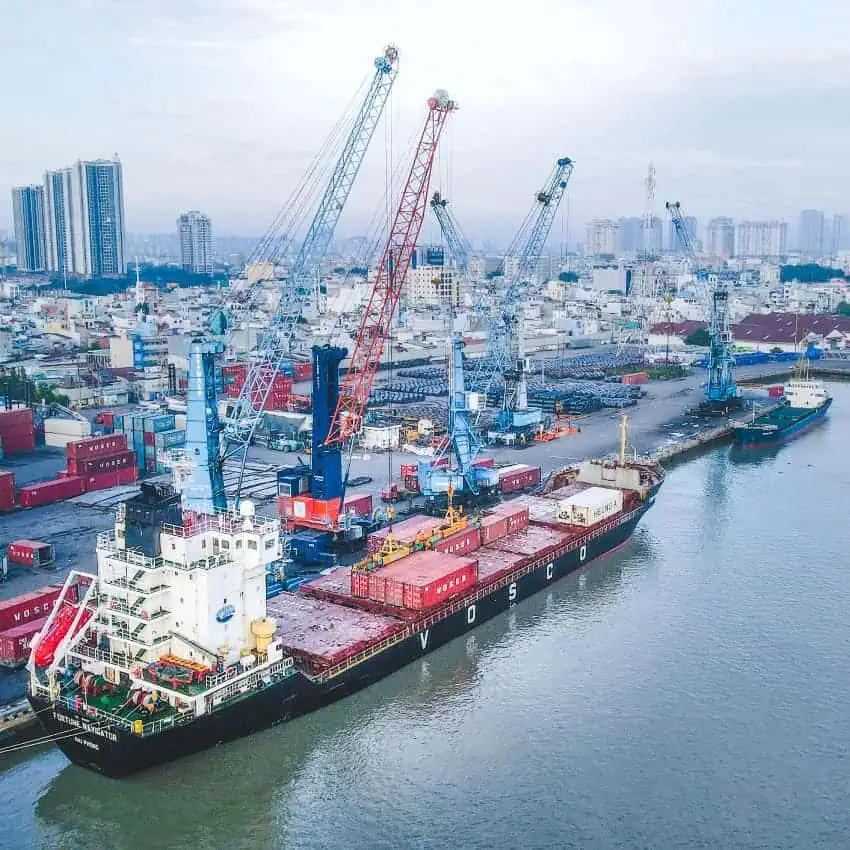In 2024, Vietnam’s logistics sector experienced a robust recovery, driven by export growth, government support, and improvements in global supply chains.
Vietnam’s exports grew by 14.9% in the first 10 months of 2024, reaching $335.6 billion, following a period of decline in 2023. Key sectors such as electronics, textiles, and agriculture continued to lead, making significant contributions to the total export turnover.
Exports Propel the Logistics Industry
Exports to the United States, Vietnam’s largest market, have nearly reached $100 billion in the first ten months of 2024, with a trade surplus exceeding $86 billion—an impressive 26.9% increase year-on-year. This surge is attributed to the shift in manufacturing from China to Vietnam amid efforts to diversify global supply chains.
The recovery in exports has spurred positive growth in the logistics sector. The total volume of goods transported through seaports is estimated to have risen by approximately 14% during the first ten months of 2024, surpassing 570 million tons.
Dry cargo and container goods accounted for a significant share, with handling volumes exceeding 321 million tons and 191 million tons, respectively. Additionally, the expansion of industrial parks, which play a central role in export supply chains, has contributed to the rising demand for logistics services.
According to CBRE, the average occupancy rate of industrial parks reached 81% in the North and 92% in the South by the end of June 2024. These figures are expected to improve further as foreign direct investment (FDI) continues to flow robustly, with total registered capital exceeding $27.26 billion in the first ten months of 2024.
A survey conducted by Vietnam Report highlights significant revenue, cost, and profit fluctuations among logistics enterprises in 2024, indicating a clear recovery in the sector.
In 2024, 82.3% of businesses forecast profit growth, with 58.8% predicting substantial increases. Meanwhile, the percentage of firms reporting profit declines dropped from 66.7% to 5.9%. This data underscores the positive impacts of export recovery, investment in logistics technology, and effective government support policies, reaffirming the sector’s recovery trajectory and its pivotal role in the global supply chain.
Vietnam Report’s survey reveals an optimistic outlook among logistics enterprises for 2025, continuing the recovery momentum of 2024. Computers, electronic products, and components retained their top position in export value. Regarding the overall logistics industry, 29.4% of respondents expect slightly improved conditions, and 11.8% are highly optimistic.
Among enterprises, 64.7% anticipate moderate improvements, while 17.6% foresee highly favorable conditions. Only 5.9% predict significant challenges, reflecting strong confidence in the sector’s robust and sustainable recovery. This optimism stems from improved internal capacities, government policy support, and growing international trade trends.
As the final year of Vietnam’s 2021–2025 Socio-Economic Development Plan approaches, the logistics sector is capitalizing on opportunities arising from global supply chain shifts. It is intensifying investments and adopting advanced technologies to solidify its vital role in the economy.
Lingering Concerns
Political instability remains a significant challenge for 82.4% of logistics enterprises, disrupting global supply chains. Geopolitical conflicts, such as the Russia-Ukraine war, U.S.-China trade tensions, and protectionist policies from major economies, have negatively impacted trade flows and international freight operations.
Economic sanctions, port closures in conflict zones, and exchange rate volatility have driven up operating costs for logistics firms. These disruptions have not only reduced operational efficiency but also extended delivery timelines, undermining the reliability of supply chains.
2024 also witnessed leadership transitions in major economies, particularly following the U.S. elections. The global community awaits potential ceasefire agreements, although trade wars might escalate with anticipated White House policies.
The survey also revealed concerns over slow global economic growth, identified as a major obstacle by 58.8% of enterprises due to reduced demand for freight transport. Declining global GDP growth has contracted trade volumes, directly affecting logistics revenue.
In its October 2024 report, the IMF lowered its global growth forecast to a modest 3.2% for both 2024 and 2025, down from 3.3% in 2023. Amid subdued global growth, Vietnam’s export turnover may struggle to achieve significant annual increases.

